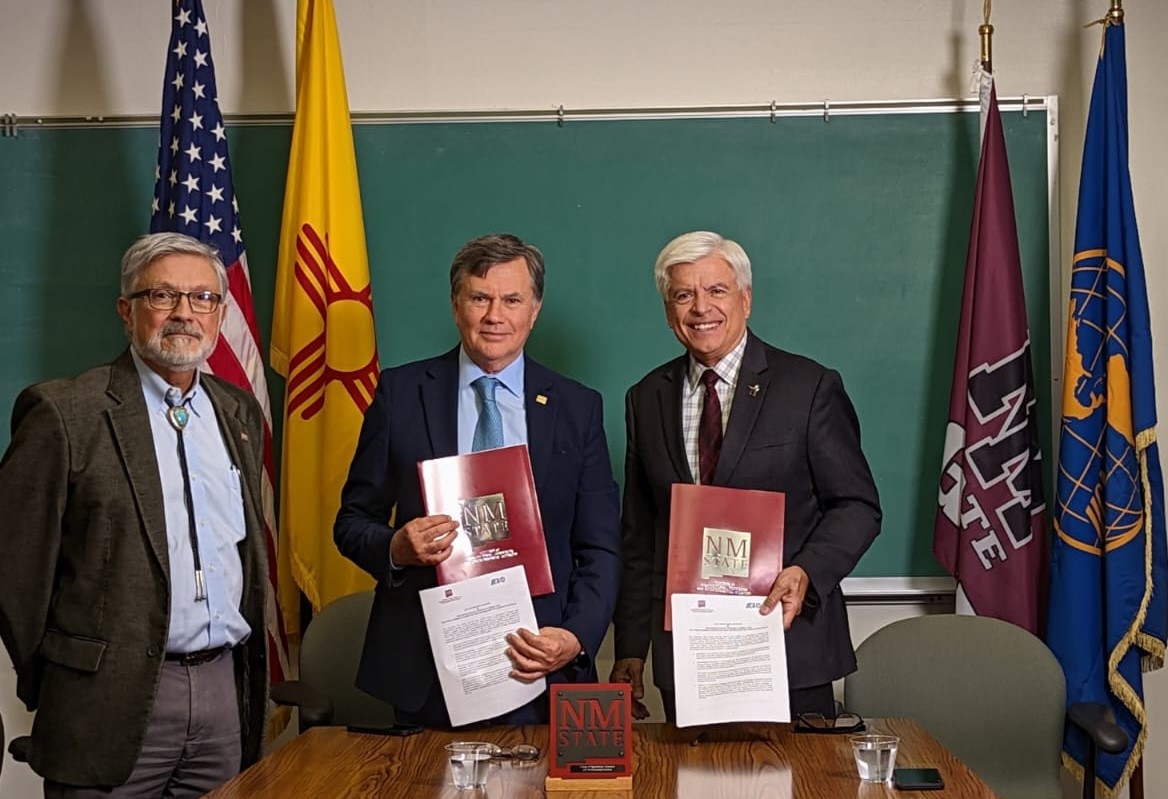The institutions signed a commitment that includes initiatives to be implemented in the short-term following a visit by IICA’s delegation, headed by Director General Manuel Otero, to NMSU’s campus.

San Jose, 17 October 2022 (IICA) – New Mexico State University (NMSU) and the Inter-American Institute for Cooperation on Agriculture (IICA) will seek to support the development of sustainable agriculture in the Americas by strengthening the use of cutting-edge technology, modern digital tools and artificial intelligence, and through actions aimed at carbon management, soil health (especially in arid and semiarid regions) and climate change.
The agreement was reached following a visit by IICA’s delegation, headed by Director General Manuel Otero, to NMSU’s campus, where they met with Dan Arvizu, Chancellor; Rolando Flores, Dean and Director of the College of Agricultural, Consumer and Environmental Sciences (ACES); and other authorities, specialists and professors from the prestigious academic institution.
Otero and Arvizu signed a statement with concrete initiatives to be prioritized in the short-term. It also strengthens the existing alliance between the entities, which was expanded in April 2022.
As part of the priority actions, in September 2023, NMSU and IICA will co-organize a global summit on agricultural sustainability in the arid and semiarid regions of the Americas entitled: “Global perspective on sustainable agriculture in the arid and semiarid regions of Latin America and the Caribbean”, which will bring together roughly twenty renowned specialists in issues related to sustainable development.
The summit will take place at NMSU’s Las Cruces campus and will dive deeper into recent advances and future challenges in the application of state-of-the-art global technologies for sustainable agriculture in the arid and semiarid regions of the Americas, through a transdisciplinary approach that involves agriculture, the environment and energy.
The conference will also have the support of public and private organizations.
“We are very excited to join IICA in building on the relationship we have already established and are enthusiastic about what it offers for the future. We will collaborate on a summit to see how we can make high-tech agriculture for the future”, stated Arvizu.
“The importance of the alliance is the possibility of working together for transformation and a better quality of life for people living in rural areas, not only in local communities, but across the continent as a whole. That is why we are excited and committed to carrying out concrete actions”, added Otero.
Training and innovation processes
The two organizations will also focus on strengthening regional capacities through a continuing education course on Data Analysis—both for individuals and institutions—as part of the efforts to generate skills in data science, artificial intelligence and the Internet of Things.
The course will be based on a proposal made by NMSU and will be delivered in conjunction with IICA.
The objective is to close the digital and access gaps, coupled with promoting the acquisition of skills in rural youth to develop digital agriculture based on science, innovation and data.
Another action that NMSU and IICA will prioritize is consolidating and establishing the “Strategic Alliance of the Chihuahuan Desert”, promoted jointly with Mexico’s Autonomous University of Chihuahua (UACH) and involving the public sector, farmer associations and civil society.
The Alliance aims to contribute to the processes of technological co-innovation in agro-industrial chains and sustainable development for an agricultural eco-region that is predominantly arid and semiarid with common characteristics that transcend borders.
Moreover, both institutions agreed to work toward developing young people to transform agriculture, organizing a 4-H mission to IICA’s headquarters early next year to generate a strategic plan at the hemispheric level.
As part of his visit to New Mexico State University, the head of IICA also explored other areas of joint work and learned about initiatives the academic center is carrying out in terms of efficient water use, best agricultural and livestock practices, renewable energy, carbon management and its relationship with climate change and the bioeconomy, agribusiness and digital agriculture for socioeconomic rural development.
“We are delighted to strengthen ties and the strategic alliance. The projection and global presence that the university could have are key for New Mexico, especially at a time when the interdependence of agriculture and global food systems is a fact. These agreements are also proof that the developments we are making at the university in terms of teaching, research and outreach are on par with the most important needs in the world of agriculture”, expressed Rolando Flores, Dean and Director of ACES.
About NMSU
NMSU is an academic institution specializing in the management of arid and semiarid lands as well as carbon and soil health management. It focuses on research, education and outreach activities on natural climate solutions to enable profitable practices that provide additional income for farmers and ranchers in New Mexico.
Founded in 1888, NMSU offers 28 doctoral programs, 58 master’s programs and 96 bachelor’s majors. It has cooperative extension offices located in each of New Mexico’s 33 counties and 12 agricultural science and research centers.
Its main campus located in Las Cruces, the second largest city in the state after the capital of Albuquerque, has more than 14,000 students from 49 US states and 89 countries.
More information:
Emmanuel Picado, Manager of the Information and Communication Technologies and Digital Agriculture Division at IICA.
emmanuel.picado@iica.int










